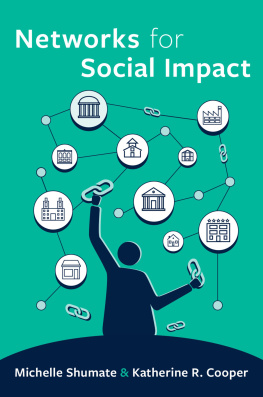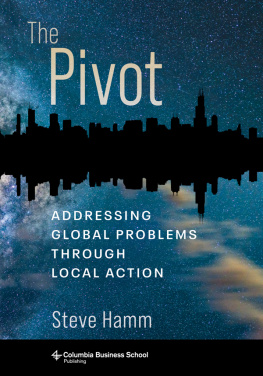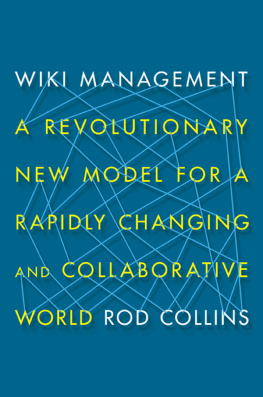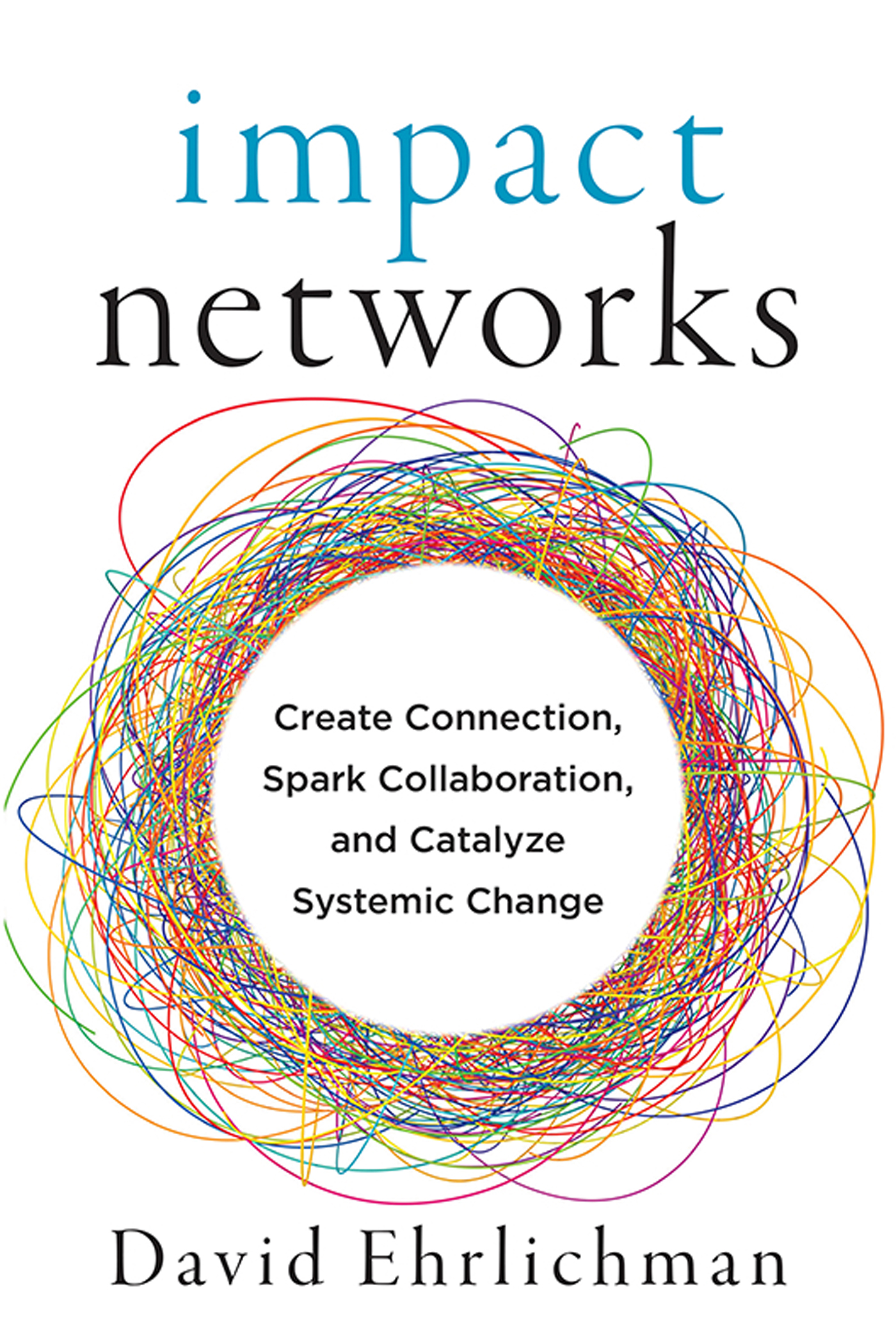impact
networks

Impact Networks
Copyright 2021 by David Ehrlichman
All rights reserved. No part of this publication may be reproduced, distributed, or transmitted in any form or by any means, including photocopying, recording, or other electronic or mechanical methods, without the prior written permission of the publisher, except in the case of brief quotations embodied in critical reviews and certain other noncommercial uses permitted by copyright law. For permission requests, write to the publisher, addressed Attention: Permissions Coordinator, at the address below.

| Berrett-Koehler Publishers, Inc.
1333 Broadway, Suite 1000
Oakland, CA 94612-1921
Tel: (510) 817-2277, Fax: (510) 817-2278
www.bkconnection.com |
Ordering information for print editions
Quantity sales. Special discounts are available on quantity purchases by corporations, associations, and others. For details, contact the Special Sales Department at the Berrett-Koehler address above.
Individual sales. Berrett-Koehler publications are available through most bookstores. They can also be ordered directly from Berrett-Koehler: Tel: (800) 929-2929; Fax: (802) 864-7626; www.bkconnection.com
Orders for college textbook/course adoption use. Please contact Berrett-Koehler: Tel: (800) 929-2929; Fax: (802) 864-7626.
Distributed to the U.S. trade and internationally by Penguin Random House Publisher Services.
Berrett-Koehler and the BK logo are registered trademarks of Berrett-Koehler Publishers, Inc.
First Edition
Paperback print edition ISBN 978-1-5230-9168-3
PDF e-book ISBN 978-1-5230-9169-0
IDPF e-book ISBN 978-1-5230-9170-6
Digital audio ISBN 978-1-5230-9171-3
2021-1
Book production: Linda Jupiter Productions. Text design: Kim Scott, Bumpy Design. Cover design: Adrian Morgan. Edit: Elissa Rabellino. Proofread: Mary Kanable. Index: Lieser Indexing.
To Nabetse, who has taught me the true meaning of connection;
to my family, who have shown me the power of trust;
and to changemakers everywhere, who have inspired me
with their commitment to purpose.
Created in Community
This book was developed in collaboration with my colleagues in Convergea network of systems strategists, designers, facilitators, educators, and evaluators who partner with people, organizations, and networks to co-create positive impact. I am endlessly grateful for their contributions and support.
Visit converge.net to learn more about Converge and to access a library of free tools and facilitation guides associated with this book.
Contents
Preface
N etworks are all around you, whether you are aware of them or not. Networks influence who you are connected to, where you get your information, and how work gets done. What if I told you that by learning how to cultivate and maintain certain networks, you would have the opportunity to unlock collaboration, unravel oppressive systems, and create unprecedented value? What if I told you that you could create a sustainable structure of organizing that would demand less pushing and introduce more pull and autonomous flow? New opportunities, insights, and perspectives become available when you start to see and engage in your world through networks.
Networks have been around forever. But only recently have we been able to draw on a variety of fieldsincluding network science, community building, systems thinking, and organizational developmentas well as a range of collaborative software tools to intentionally create networks not just for social connection but also for collective action. Not only are networks the organic social structures that we naturally form; they can be cultivated to accelerate learning, spark collaboration, and catalyze systemic change.
Networks are webs of relationships connecting people or things. When they seek to address social and environmental issues, they are called impact networks. This special type of network brings individuals and organizations together for learning and coordinated action, based on a shared purpose. Impact networks provide a transformational way of working together across the typical boundaries that often hold us back. They offer a collaborative infrastructure for a more equitable, interdependent world. As a powerful and flexible organizing system that can span regions, organizations, and silos of all kinds, impact networks underlie some of the most impressive and large-scale efforts to create change across the globe.
This book is about how to cultivate impact networks that enable diverse groups of people to connect, coordinate, and collaborate within and across organizations to do more together than is possible alone. Given the increasing complexity of our society and the issues we face, our ability to form, grow, and work through networks has never been more essential.
This book is for all those who recognize the need to work together more than ever before, for those who are addressing issues bigger than any individual or organization can solve on its own, and for changemakers who are looking for ways to collaborate across a diversity of stakeholders to navigate the wicked challenges of our time.
This book is also for anyone who is curious about, participating in, or leading collaborative networks, including those who coordinate, weave, and facilitate networks; those who fund and support networks; and all those who work in collaboration with others to get things done. Collaborative networks may be called many things: associations, alliances, coalitions, collaborations, collective impact initiatives, consortia, and more. Whatever they are called, the network approach to collaboration is profoundly different from the command-and-control approaches seen in many hierarchical organizations. Likewise, the form of leadership required to guide networks is substantially different from the autocratic forms of leadership that remain prevalent throughout the world. If you are supporting or working with a constellation of actors to address complex issues and advance common goals, this book is for you.
I wrote this book because I believe deeply in the power of impact networks to contribute to a future that works for all. The network approach builds bridges across divides, prioritizes trust-based relationships, shares leadership, and recognizes the inherent interconnectedness of our lives and work. Networks are the organizing systems that allow our society to function today and can enable us to flourish in the future.
I was first exposed to the potential of networks while working at Monitor Institute, the social sector wing of a global management consulting firm. Up to that point, I had worked only in hierarchical environments: in the service industry, in a nonprofit, in a large corporation, and with a small start-up. Every organization where I had worked had a pyramid structurethere was always a boss and a clear chain of command to indicate authority. Decisions were mostly made at the top and passed down to employees. Information was shared on a need-to-know basis. But Monitor Institute was, at that time, exploring and writing about working through networks.










